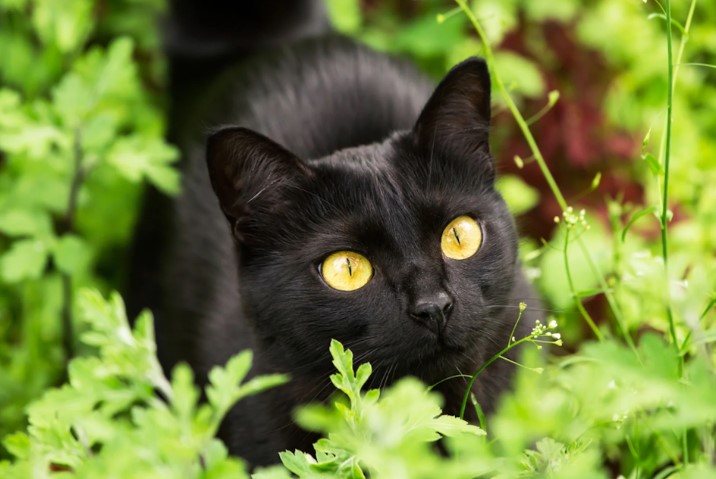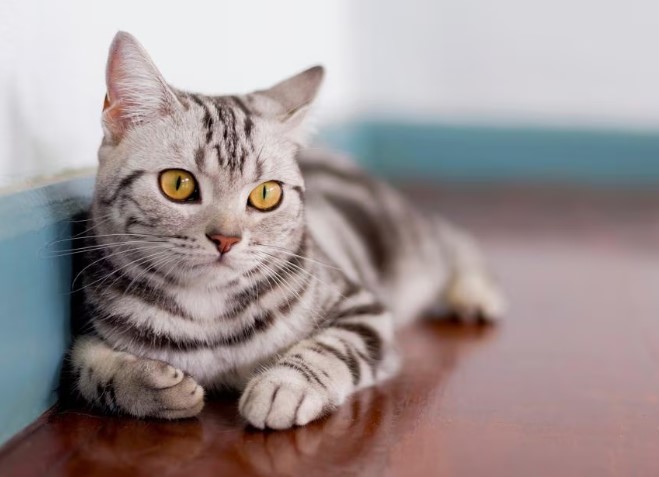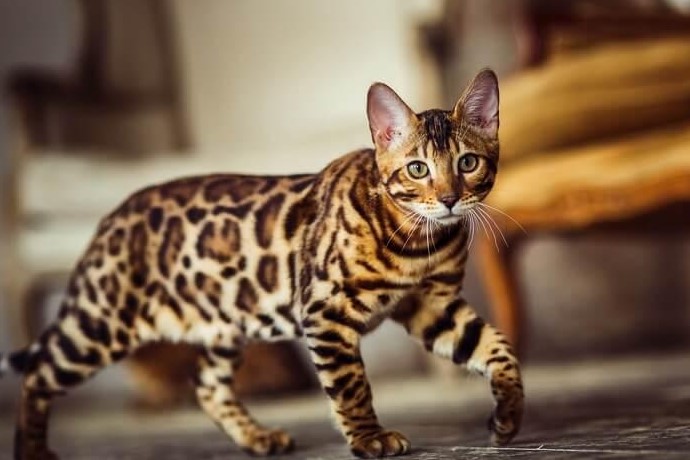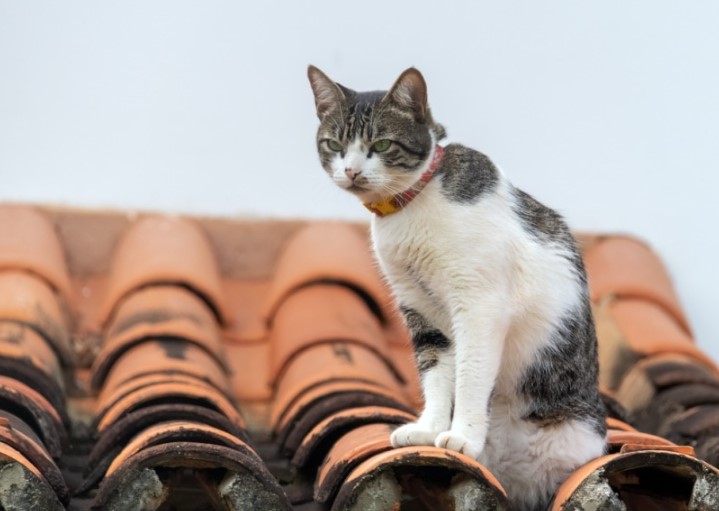
Bombay Cat
Introduction
If you’re a cat lover, chances are you’ve come across the sleek and elegant Bombay cat. These stunning black cats are known for their panther-like appearance and affectionate nature. But what exactly makes a Bombay cat so special? Let’s dive into everything you need to know about these captivating felines.
What is a Bombay Cat?
Distinctive Features
Bombay cats are easily recognizable due to their striking all-black coat that shimmers with a patent-leather sheen. Their muscular build, rounded head, and large, expressive copper or gold eyes give them an exotic look reminiscent of a miniature black panther.
Personality Traits
Don’t let their wild appearance fool you; Bombay cats are incredibly friendly and sociable. They thrive on human interaction and are known for their playful and affectionate demeanor. These cats are often described as dog-like due to their loyalty and eagerness to follow their owners around the house.
History and Origin
Creation and Breeding
The Bombay cat is a relatively modern breed, created in the 1950s by American breeder Nikki Horner. Her goal was to develop a cat that resembled a mini black panther, combining the sleek look of the Burmese with the elegant black coat of the American Shorthair.
Popularity Over the Years
Although initially met with resistance, the breed quickly gained popularity for its unique appearance and charming personality. Today, the Bombay cat is recognized by major cat registries and beloved by cat enthusiasts worldwide.
Physical Characteristics
Size and Weight
Bombay cats are medium-sized, typically weighing between 8 to 15 pounds. They are muscular and well-proportioned, giving them a solid, athletic appearance.
Coat and Color
The Bombay’s coat is short, dense, and jet black, with a glossy finish that makes them look like they’re always freshly polished. Their fur is fine and lies close to the body, adding to their sleek look.
Eyes and Ears
One of the most captivating features of the Bombay cat is its eyes. Large, round, and set wide apart, their eyes range from a vibrant copper to a deep gold, adding to their striking appearance. Their ears are medium-sized and slightly rounded at the tips, complementing the overall rounded contours of their face.
Personality and Behavior
Social Nature
Bombay cats are the social butterflies of the feline world. They thrive on interaction and can often be found seeking attention from their human companions. They’re not the type to hide under the bed when guests arrive; instead, they might greet newcomers at the door.
Interaction with Humans
These cats are known for their affectionate nature. They enjoy cuddling, being petted, and will often follow their owners from room to room. They’re also quite vocal and will communicate with a distinctive, soft voice.
Compatibility with Other Pets
Bombay cats typically get along well with other pets, including dogs. Their playful and adaptable nature makes them great companions in multi-pet households. However, as with any pet, early socialization is key to ensuring harmonious relationships.
Health and Lifespan
Common Health Issues
Bombay cats are generally healthy, but like all breeds, they can be prone to specific health issues. Some of these include hypertrophic cardiomyopathy (a heart condition) and respiratory issues due to their short muzzle.
Lifespan and Aging
With proper care, Bombay cats can live between 12 to 16 years. Regular veterinary check-ups, a balanced diet, and a healthy lifestyle can help ensure they live a long, happy life.
Diet and Nutrition
Nutritional Needs
Bombay cats have similar nutritional needs to other domestic cats. They require a diet high in protein, moderate in fat, and low in carbohydrates. Ensuring they get the right balance of vitamins and minerals is also crucial for their overall health.
Best Types of Food
High-quality commercial cat foods, both wet and dry, are suitable for Bombay cats. Look for brands that list meat as the first ingredient and avoid those with excessive fillers or artificial additives. Occasionally, a raw or homemade diet can be considered, but always consult with a veterinarian before making significant changes to their diet.
Grooming and Maintenance
Coat Care
One of the perks of owning a Bombay cat is their low-maintenance coat. Their short, sleek fur requires minimal grooming. A weekly brushing will help remove loose hairs and keep their coat shiny and healthy.
Nail and Teeth Maintenance
Regular nail trimming and dental care are essential for Bombay cats. Providing dental treats, toys, and regular brushing can help maintain their oral health. It’s also beneficial to introduce them to these routines from a young age to make the process easier as they grow.
Training and Exercise
Basic Training Tips
Bombay cats are intelligent and can be trained to perform simple tricks or commands. Positive reinforcement, such as treats and praise, works well. Training sessions should be short and fun to keep their attention.
Exercise Needs
Although they are not hyperactive, Bombay cats do enjoy playtime and need regular exercise to stay healthy. Interactive toys, climbing trees, and engaging in play sessions with their owners can help keep them physically and mentally stimulated.
Living Environment
Ideal Home Setup
Bombay cats are adaptable and can thrive in various living environments, from apartments to larger homes. They do best in households where they receive plenty of attention and mental stimulation.
Indoor vs. Outdoor Living
While some cats enjoy exploring the outdoors, Bombay cats are generally safer and healthier when kept indoors. If you choose to let your Bombay outside, it’s best to supervise them or provide a secure outdoor enclosure.
Adoption and Buying Tips
Where to Find a Bombay Cat
If you’re considering adding a Bombay cat to your family, start by checking local animal shelters and rescue organizations. Many purebred cats, including Bombays, can be found in shelters. Additionally, reputable breeders can be an option if you’re looking for a specific lineage.
What to Look For in a Breeder
When choosing a breeder, it’s essential to find someone who prioritizes the health and well-being of their cats. Look for breeders who perform health screenings, provide proper socialization, and have positive reviews or references.
Bombay Cats and Families
Great Companions for Families
Bombay cats make excellent family pets. Their friendly and playful nature allows them to bond well with children. They are patient and gentle, making them suitable companions for kids of all ages.
Bonding with Children
These cats are known to form strong bonds with children, often becoming a child’s best friend and playmate. Their affectionate demeanor and playful antics can provide endless entertainment and companionship.
Common Myths and Misconceptions
Debunking Myths
One common myth about Bombay cats is that their black coat brings bad luck. This superstition is unfounded and shouldn’t deter anyone from experiencing the joy of owning one of these beautiful cats. In reality, many cultures consider black cats to be symbols of good fortune.
Understanding the Truth
Bombay cats are just as lovable and wonderful as any other breed. Their unique characteristics make them stand out, but at the end of the day, they’re affectionate and loyal pets who can bring immense joy to any household.
Fun Facts about Bombay Cats
Unique Traits and Trivia
Did you know that Bombay cats were bred to look like miniature panthers? Their striking resemblance to these majestic wild cats is intentional, making them a truly unique breed. Additionally, Bombays are known for their dog-like loyalty, often following their owners from room to room.
Famous Bombay Cats
While not as commonly featured in media as some other breeds, Bombay cats have made their mark. One famous Bombay is “Sable,” who became the inspiration for the breed’s development. Although not a celebrity, Sable’s legacy lives on in the striking appearance of every Bombay cat.
Conclusion
In conclusion, Bombay cats are a remarkable breed with their sleek, black coats and affectionate personalities. Whether you’re looking for a playful companion, a loyal friend, or a strikingly beautiful pet, a Bombay cat might be the perfect addition to your family. Their easygoing nature and unique appearance make them a standout choice for cat lovers everywhere.
FAQs
Are Bombay Cats Hypoallergenic?
No, Bombay cats are not hypoallergenic. While they have short coats, they still produce dander, which can trigger allergies in sensitive individuals.
Do Bombay Cats Get Along with Dogs?
Yes, Bombay cats typically get along well with dogs. Their social and adaptable nature helps them integrate well into multi-pet households.
How Much Do Bombay Cats Typically Cost?
The cost of a Bombay cat can vary depending on factors like lineage, breeder reputation, and location. On average, you can expect to pay between $500 to $2,000.
What is the Best Way to Train a Bombay Cat?
Positive reinforcement is the best way to train a Bombay cat. Use treats, praise, and short, fun training sessions to keep them engaged and motivated.
Do Bombay Cats Need Special Care?
While Bombay cats do not require special care, regular veterinary check-ups, a balanced diet, and proper grooming are essential to keeping them healthy and happy.



